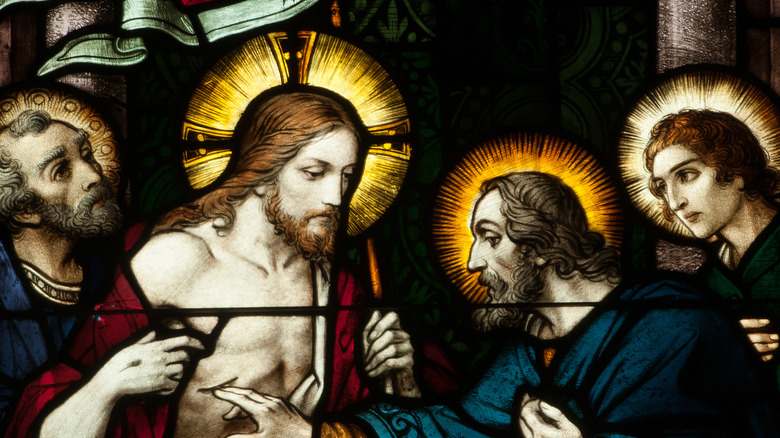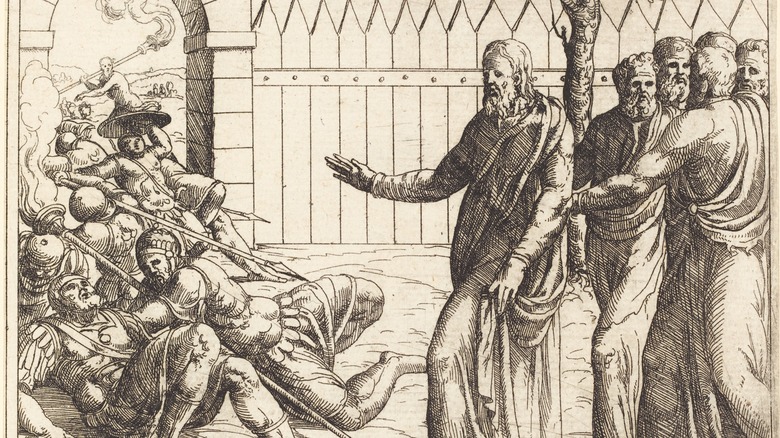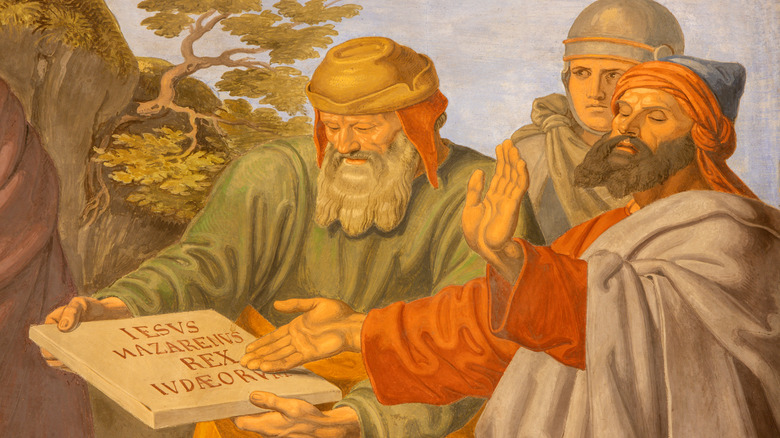The Untold Truth Of The Gospel Of John
For centuries, many have referred to the collection of biblical books that tell the story of the life and ministry of Jesus Christ, collectively, as the four gospels. Each book — Matthew, Mark, Luke and John — recounts key events from Jesus' life, including his resurrection, and purports to give the reader some insight into the story of the prophet and central figure of Christianity. All four books share certain similarities, including their overall push to give the reader each author's take on the main highlights of the narrative, and indeed, all four include narratives about, for example, Jesus' miracle in which he fed 5,000 people with five loaves of bread and two fish (via Bible Gateway).
However, the Gospel of John stands out from the other gospels in several key ways. Indeed, 2,000 years after it was written, Bible scholars continue to study the text within the context of both its similarities to the other gospels and the differences.
The Gospel of John is in a separate literary category
Bible scholars refer to the three gospels not named "John" as the Synoptic Gospels, as Learn Religions explained. Matthew, Mark, and Luke are all similar in that they contain characters, geographic settings, and other elements that you would find in a plot-driven narrative. Additionally, each contains, at the very least, a few sentences or paragraphs here and there of Jesus' teachings, whereas John devotes lengthy passages to word-for-word recitations of Jesus' sermons. Overall, John, by comparison, is more introspective, more theological than his counterparts. For example, where Luke gives a narrative of Jesus' birth that is so straightforward that children can be cast in the roles of the main characters. John's account of Jesus' birth, by comparison, is a dense, theological exploration of the concept of light coming into the world.
Why the differences? It's impossible to know for certain, of course, but Learn Religions writer Sam O'Neal points to the fact that John's gospel was written about 20 years after that of his colleagues, and perhaps the writer wanted to give the readers some context that they didn't have in the other gospels available to them.
'The disciple whom Jesus loved'
The Gospel of John, according to Bible Odyssey, contains five references to "the disciple whom Jesus loved." Specifically, in each instance, John will set the scene and then identify by name at least one of the other disciples involved in the narrative (Peter, for example), and then refer to another disciple with the cryptic reference.
Traditionally, Bible scholarship has held that this was John's way of referring to himself. However, it bears noting that this view is informed by the traditionalist assumption that the Gospel of John was written by Jesus' disciple, John, and not an anonymous writer or series of editors and compilers.
Further, at least one line of thinking suggests that the phrase "the disciple whom Jesus loved" referred to a romantic or even a sexual relationship between the two men, according to QSpirit.
So why did John employ such a cryptic way of referring to himself? The reason could be as simple as his wanting to avoid confusion with another man named John who figures into the narrative: John the Baptist, as Lexham Press notes.
John devotes seven chapters to one night
All four gospels give at least some amount of attention to Jesus' death and resurrection — his Passion, as it's referred to in biblical scholarship. And of course, as this is a critically important part of the story, it makes perfect sense that it would be included. John, however, takes things a couple of steps further, according to U.S. Catholic. He devoted seven whole chapters to the events that began with the night after Jesus triumphantly arrived in Jerusalem as king, through his arrest and trial, as well exacting descriptions of his torturous death, including claims that aren't made in the other gospels, such as that the legs of the other criminals crucified with Jesus were broken to hasten their deaths, while Jesus' were not.
Indeed, John's description of Jesus' passion is more brutal than that of the other gospel writers. But there's a reason, says U.S. Catholic: The brutality of Jesus' death is contrasted with John's competing narrative about Jesus overcoming death, which he accepts with "majesty," as the writer noted.
John may have written four other New Testament books
When it comes to the authorship of the books of the Bible, there are two general and competing schools of thought. The traditionalist view is that each and every book that bears the name of a single man (for example, Isaiah or John) was written by a man with that name. The competing view is that most or all of the books of the Bible were copied from earlier sources, edited by later editors, and/or compiled by copiers and editors.
If the traditionalist view of the authorship of the New Testament holds true, according to Zondervan Academic, then Jesus' disciple, John, is responsible for five of the books in the text: the gospel that bears his name, three epistles (letters) attributed to him (1 John, 2 John, and 3 John), and a book of prophecy (Revelation). Of course, two centuries of modern biblical scholarship have largely come to reject this idea that one man is responsible for all five books. Indeed, John was a common name at the time, and the books could have been written by two or more men with the same name, or they could have had the name attributed to them for no good reason by later copiers and editors.
The whole thing may have been a hoax
Claims that the author of a biblical text is not who tradition holds it do be are one thing; claims of whole-cloth forgeries are another beast entirely. Nevertheless, when it comes to the Gospel of John (and three other New Testament books that bear his name), at least one Bible scholar believes that the book is not only incorrectly attributed, but that it was a hoax.
As The Daily Beast explains, one school of thought in biblical scholarship holds that the Gospel of John and "his" three epistles were the work of a "Johannine Community" — a group of followers of Jesus who were themselves led by someone who knew Jesus personally, viz John. However, Hugo Mendez, an assistant professor of religious studies at UNC-Chapel Hill, claims that not only is there no historical or archaeological evidence of this community, but that there was precedent in the first century for forgers to write texts and claim they were written by Jesus' disciples.





